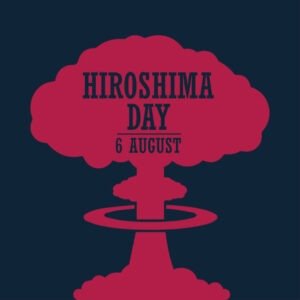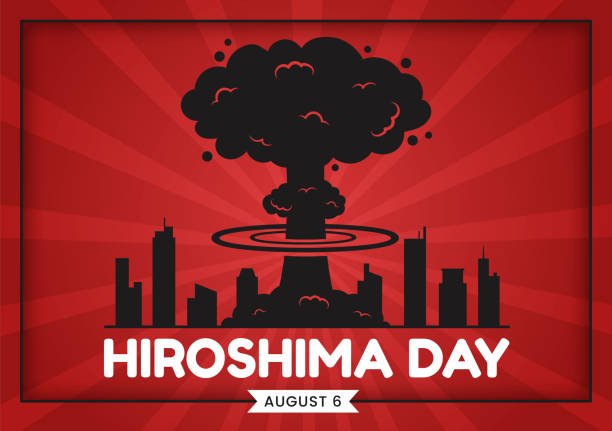Hiroshima Day 2025: Every year on August 6, the world observes Hiroshima Day to remember the victims of the atomic bombing on Hiroshima in 1945. It is a day of reflection, mourning, and a renewed call for peace and nuclear disarmament. More than just a historical commemoration, Hiroshima Day serves as a moral reminder of the devastating consequences of war and the urgent need for humanity to embrace non‑violence and diplomacy.

The Tragedy of August 6, 1945
On the morning of August 6, 1945, during the final days of World War II, the United States dropped an atomic bomb, code‑named Little Boy, on the Japanese city of Hiroshima. At 8:15 a.m., the bomb exploded approximately 600 meters above the city, instantly destroying most of Hiroshima.
The impact was catastrophic:
-
Around 70,000 people were killed immediately.
-
By the end of 1945, the death toll had risen to 140,000 due to radiation, burns, and injuries.
-
Tens of thousands suffered long‑term effects such as cancer, birth defects, and psychological trauma.
Just three days later, on August 9, 1945, another atomic bomb was dropped on Nagasaki, leading to Japan’s surrender and the end of World War II.
While these events brought the war to a close, they also marked the first and only time nuclear weapons were used in armed conflict, leaving an indelible scar on humanity’s conscience.
Why Hiroshima Day Matters:
Hiroshima Day is not just about remembering the destruction; it is about learning from history. The tragedy highlights three key messages:
-
The Value of Human Life – The atomic bombings remind us of the sanctity of human life and the suffering that war inflicts on ordinary people.
-
The Dangers of Nuclear Weapons – Even today, several countries possess nuclear arsenals. Hiroshima serves as a warning against their use.
-
The Need for Peace and Diplomacy – True security cannot be achieved through weapons of mass destruction but through cooperation, trust, and dialogue.
Global Observances of Hiroshima Day:
Every year, Hiroshima Peace Memorial Park in Japan becomes the center of remembrance. Thousands of people, including survivors (called hibakusha), world leaders, and peace activists, gather to pay tribute. Ceremonies often include:
-
The Peace Bell is ringing to honor the victims.
-
Floating lanterns on the Motoyasu River symbolize souls lost.
-
Moments of silence at 8:15 a.m., the exact time of the bombing.
-
Prayers and speeches calling for nuclear disarmament.
Around the world, peace organizations, schools, and governments hold discussions, art exhibitions, and memorial services to mark Hiroshima Day. It has become a global symbol of the fight against nuclear weapons.
Lessons for Today’s World:
Seventy‑nine years after Hiroshima, the world still faces threats of nuclear proliferation, terrorism, and violent conflicts. Hiroshima Day urges us to rethink our approach to global security.
-
Nuclear Disarmament: Despite decades of treaties, around 12,500 nuclear warheads still exist worldwide. The Hiroshima tragedy warns us of the unimaginable destruction these can cause.
-
Peace Education: Teaching younger generations about Hiroshima ensures that they value peace over aggression.
-
Global Unity: Issues like climate change, poverty, and pandemics show that nations must cooperate instead of competing for dominance.
Voices of the Survivors:
The testimonies of the hibakusha remain one of the most powerful aspects of Hiroshima Day. Survivors often share stories of loss, suffering, and resilience to remind the world never to repeat such horrors. Many of them dedicate their lives to peace activism, visiting schools and international forums to advocate for a nuclear‑free world.
Their voices are fading as time passes, but their message grows stronger: “Never again.”
How Individuals Can Contribute:
Even as individuals, we can play a role in honoring Hiroshima Day:
-
Observe a moment of silence on August 6.
-
Read or share survivor stories to spread awareness.
-
Support peace organizations working for nuclear disarmament.
-
Educate others about the consequences of war.
-
Promote dialogue and tolerance in everyday life.
Small actions collectively contribute to a culture of peace.
Hiroshima Day is more than a date on the calendar—it is a solemn reminder of the darkest chapter in human history and a call to build a brighter, peaceful future. As we remember the victims of August 6, 1945, we must pledge to uphold the values of peace, compassion, and global unity.
The legacy of Hiroshima is not just about destruction—it is about the human spirit’s determination to ensure such devastation never happens again. On this day, let us commit to a world where nuclear weapons are abolished and peace is not just an ideal but a reality.
ऐसे और भी Global लेखों के लिए हमारे साथ जुड़े रहें! Khabari bandhu पर पढ़ें देश-दुनिया की ताज़ा ख़बरें — बिज़नेस, एजुकेशन, मनोरंजन, धर्म, क्रिकेट, राशिफल और भी बहुत कुछ।
Kelley Mack Dies at 33: The Walking Dead Actress Remembered for Her Courage and Legacy

